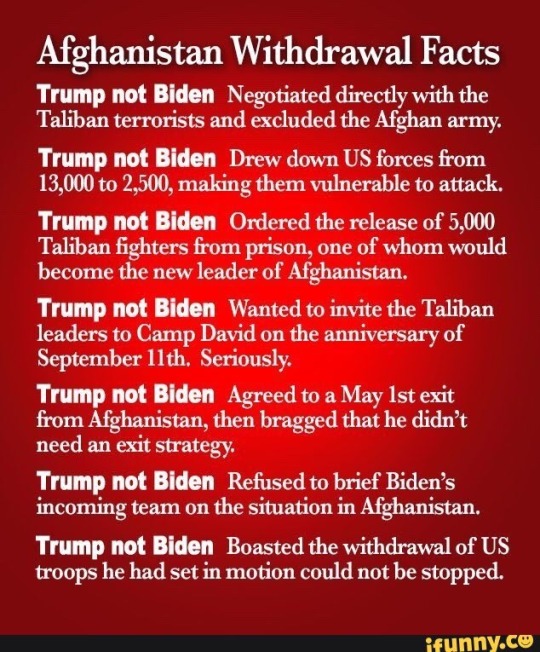#taliban
Text
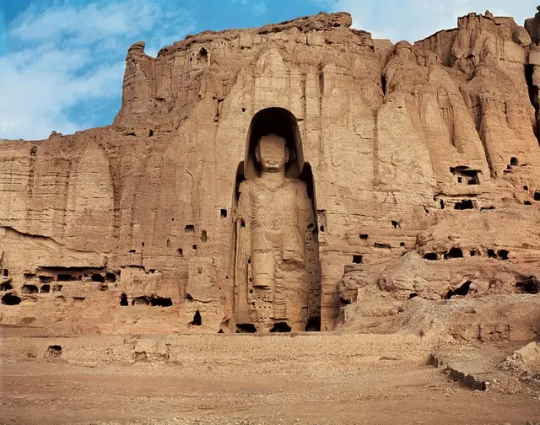
The 6th century Buddha of Bamiyan in Afghanistan Before the Taliban blasted it into rubble.
2K notes
·
View notes
Text
Taliban has announced that women in Afghanistan will be stoned to death in public for adultery.
The Afghan Taliban’s supreme leader, Mullah Hibatullah Akhundzada, has issued a disturbing proclamation, vowing to implement brutal punishments against women in public. In a chilling voice message broadcasted on state television, Akhundzada directly addressed Western officials, dismissing concerns about violating women’s rights by stoning them to death.
"You say it’s a violation of women’s rights when we stone them to death," Akhundzada stated. "But we will soon implement the punishment for adultery. We will flog women in public. We will stone them to death in public," he declared, marking his most severe rhetoric since the Taliban seized control of Kabul in August 2021.
These grim statements, purportedly from Akhundzada, who has seldom been seen in public except for a few outdated portraits, emanate from Afghanistan’s state TV, now under Taliban control. Akhundzada is believed to be located in southern Kandahar, the Taliban's stronghold. Despite early assurances of a more moderate regime, the Taliban swiftly reverted to harsh public penalties reminiscent of their previous rule in the late 1990s, including public executions and floggings. The United Nations has vehemently criticised these actions, urging the Taliban to cease such practices.
In his message, Akhundzada asserted that the women's rights advocated by the international community contradicted the Taliban’s strict interpretation of Islamic Sharia law. Akhundzada emphasised resilience among Taliban fighters, urging them to oppose women's rights persistently. "I told the Mujahedin that we tell the Westerners that we fought against you for 20 years and we will fight 20 and even more years against you," he stated.
His remarks have sparked outrage among Afghans, with many calling for increased international pressure on the Taliban.
"The money that they receive from the international community as humanitarian aid is just feeding them against women," lamented Tala, a former civil servant from Kabul.
"As a woman, I don’t feel safe and secure in Afghanistan. Each morning starts with a barrage of notices and orders imposing restrictions and stringent rules on women, stripping away even the smallest joys and extinguishing hope for a brighter future," she added.
"We, the women, are living in prison," Tala emphasised, "And the Taliban are making it smaller for us every passing day."
Taliban authorities have also barred 330,000 girls from returning to secondary school for the third consecutive year. University doors were closed to women in December 2022 and participation in the workforce is heavily restricted.
#please keep the women of afghanistan in your prayers#afghanistan#taliban#women's rights#feminism#tw violence#south asia#afghan
571 notes
·
View notes
Text
I sometimes think about men have almost the same rights, body autonomy, freedom in every country while for women life looks so different from country to country or at least from region to region.
In some countries you're forced to cover your head, in others you're prohibited from covering your head and in other countries you can wear/not wear what you want. You can have an abortion in that country but not this one. You can get education, degrees and have paying jobs in most countries but not in others. You can go to a doctor if you need to but there you can't because women aren't allowed to become doctors and women aren't allowed to see a male doctor..
I sometimes think about how shitty the country i live in is but then i think well at least i can get an education and go to a doctor.. i shouldn't have to be grateful for those things..
#it's just sad and so fucking miserable#feminism#equality#freedom for iran#iran protests#arab women#womens rights#womens liberation#male privilege#taliban#just a rant#👑
1K notes
·
View notes
Text
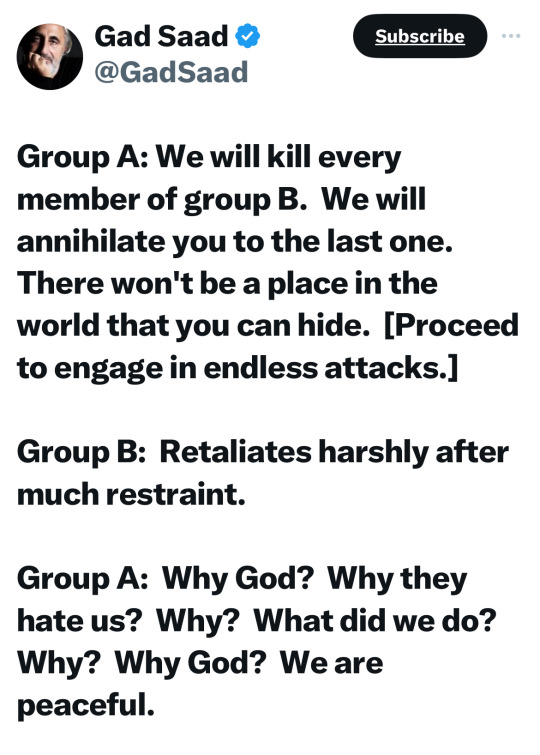
I truly adore Gad Saad.
#israel#secular-jew#jewish#judaism#israeli#jerusalem#diaspora#secular jew#secularjew#islam#indigenous#indigeneity#gad saad#antisemitism#Hamas#Gaza#Gazans#never forget#never again#no ceasefire#israel hamas war#hamas massacre#al shabab#Al asqa brigades#hezbollah#Taliban#Isis#hamas is isis#the religion of peace#the religion of pieces
277 notes
·
View notes
Text
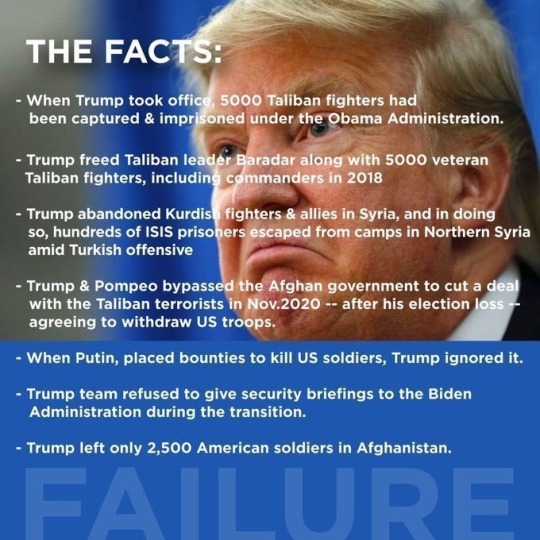

#republican assholes#Taliban#Kurds#Isis#Putin’s bounty on US troops#traitor trump#crooked donald#traitor#maga morons
297 notes
·
View notes
Text
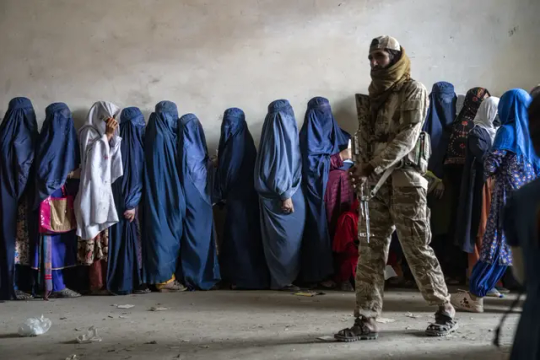
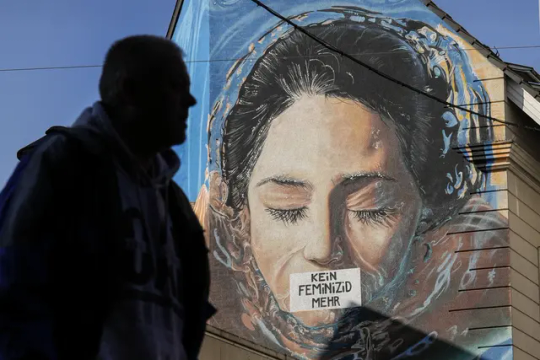
By EDITH M. LEDERER Updated 9:11 PM PST, March 8, 2024
UNITED NATIONS (AP) —
Legal equality for women could take centuries as the fight for gender equality is becoming an uphill struggle against widespread discrimination and gross human human rights abuses, the United Nations chief said on International Women’s Day.
Secretary-General Antonio Guterres told a packed U.N. commemoration Friday that “a global backlash against women’s rights is threatening, and in some cases reversing, progress in developing and developed countries alike.”
The most egregious example is in Afghanistan, he said, where the ruling Taliban have barred girls from education beyond sixth grade, from employment outside the home, and from most public spaces, including parks and hair salons.
At the current rate of change, legal equality for women could take 300 years to achieve and so could ending child marriage, he said.
Guterres pointed to “a persistent epidemic of gender-based violence,” a gender pay gap of at least 20%, and the underrepresentation of women in politics. He cited September’s annual gathering of world leaders at the U.N. General Assembly, where just 12% of the speakers were women.
“And the global crises we face are hitting women and girls hardest — from poverty and hunger to climate disasters, war and terror,” the secretary-general said.
In the past year, Guterres said, there have been testimonies of rape and trafficking in Sudan, and in Gaza women women and children account for a majority of the more than 30,000 Palestinians reported killed in the Israeli-Hamas conflict, according to the Gaza Ministry of Health.
He cited a report Monday by the U.N. envoy focusing on sexual violence in conflict that concluded there are “reasonable grounds” to believe Hamas committed rape, “sexualized torture” and other cruel and inhumane treatment of women during its surprise attack in southern Israel on Oct. 7. He also pointed to reports of sexual violence against Palestinians detained by Israel.
International Women’s Day grew out of labor movements in North America and across Europe at the turn of the 20th century and was officially recognized by the United Nations in 1977. This year’s theme is investing in women and girls to accelerate progress toward equality.
Roza Otunbayeva, the head of the U.N. political mission in Afghanistan, told the Security Council on Wednesday that what is happening in that country “is precisely the opposite” of investing in women and girls.
There is “a deliberate disinvestment that is both harsh and unsustainable,” she said, saying the Taliban’s crackdown on women and girls has caused “immense harm to mental and physical health, and livelihoods.”
Recent detentions of women and girls for alleged violations of the Islamic dress code “were a further violation of human rights, and carry enormous stigma for women and girls,” she said. It has had “a chilling effect among the wider female population, many of whom are now afraid to move in public,” she said.
Otunbayeva again called on the Taliban to reverse the restrictions, warning that the longer they remain, “the more damage will be done.”
Sima Bahous, the head of UN Women, the agency promoting gender equality and women’s rights, told the commemoration that International Women’s Day “sees a world hobbled by confrontation, fragmentation, fear and most of all inequality.”
“Poverty has a female face,” she said. “One in every 10 women in the world lives in extreme poverty.”
Men not only dominate the halls of power but they “own $105 trillion more wealth than women,” she said.
Bahous said well-resourced and powerful opponents of gender equality are pushing back against progress. The opposition is being fueled by anti-gender movements, foes of democracy, restricted civic space and “a breakdown of trust between people and state, and regressive policies and legislation,” she said.
[Click on the link to continue reading]
#women's rights#femicide#taliban#women's oppression#international women's day#global feminism#feminism
291 notes
·
View notes
Text





489 notes
·
View notes
Text
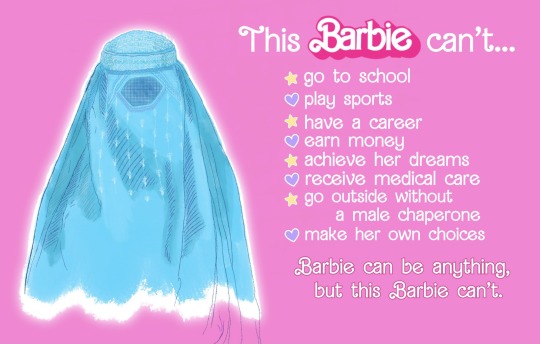
Please, don’t forget about the women in Afghanistan.
This image is not at all a commentary on Islam and/or of the different head-coverings that a woman may choose to wear while respecting her faith. Wearing a burqa/burka does not equate to an inherent lack of rights/freedom. This is also not a criticism of the Barbie movie. This is a statement about the brutal treatment of the women and girls in Afghanistan (as well as in Iran).
I loved the Barbie movie and think it’s a very important and empowering film. However, it is a bit jarring when I’m scrolling through my phone, listening to the Barbie soundtrack, and I come across an article detailing the mounting horrors these women face in these countries. There is so much happening in the world, and it all needs news time, but the virtual media silence on this topic is frightening.
Even though my country isn’t perfect (especially so after June of last year), it’s easy to lose perspective on how privileged I am.
The many different flavors of western feminism aren’t for everyone and every culture; to think so would be privileged and tone deaf. There is no "one-size-fits-all" kind of empowerment. But, objectively, what is happening to women and girls in Afghanistan and Iran is abhorrent and cannot be forgotten.
If Barbie can be anything, then Barbie can be an advocate and an activist. Do what you can, Barbies.
“I am not free while any woman is unfree, even when her shackles are very different from my own.” ― Audre Lorde
#political#this is a Star Trek (mostly) blog but Star Trek is activism so...#I rarely post political posts but this one will be an exception#Barbie is about more than just wearing pink and “slaying”#I can't girl boss while ignoring any and all girl bossing duties#anti hijab laws in some western countries are also shitty. no doubt#be as involved as you can while maintaining your mental health. Advocate for others but not at your own risk#politics#feminism#afghanistan#taliban#protests#activism#activist#barbie#the barbie movie#barbie movie 2023#barbie the movie#barbie 2023#news#media#world news#islam#muslim#feminist
697 notes
·
View notes
Text

JK Rowling is trying to sue people for sharing a screenshot of this tweet that she liked where somebody defends the Taliban.

Now I'm only showing this so people know what not to share. Please spread around the fact that JK Rowling doesn't want that screenshot to be shared so people know not to share it!
#jk rowling#terf#taliban#the taliban#harry potter#trans#transgender#trans people#tw: transphobia#queue
286 notes
·
View notes
Text

this zionist cuck is always getting bodied on his own show lmaooo
#Lebanon's economic struggles#American politics#Middle East turmoil#geopolitical interference#Lebanon#impoverished#struggling country#American invasion#interference#Taliban#Middle East#American interference
128 notes
·
View notes
Video
As most of you have read by now, Taliban has banned women from university education. These brave Afghan women took the streets protesting the closure. It will start with university and eventually trickle down. Taliban is fearful of educated women.
U.S. Secretary of State Antony J. Blinken said late Tuesday that no other country in the world bars women and girls from receiving an education."The Taliban cannot expect to be a legitimate member of the international community until they respect the rights of all in Afghanistan," he warned. "This decision will come with consequences for the Taliban."
Frankly, US can go f*** itself. They allowed this to happen. Biden allowed this to happen. What the hell did they think was going to happen once Taliban came back to power? Did they think that Taliban was going to allow women to be educated, to be free? Of course they didn’t; of course the US knew this was the end result. They didn’t care because Afghan women are nonhumans in their eyes. So, Blinken can say whatever he wants. His words are empty and the US is partly responsible for what is happening to Afghan women and to Afghanistan. The audacity of US administrations knows no limits.
It’s up to us to help. To put pressure on western governments to do something, such as, fair refugee laws that would help these women and girls to come to the west and live normal lives. And also, pronouncing Taliban as an illegitimate government.
Stand with the women of Afghanistan. Be their voice. Show that the world we care.
I will try to put together a link for petitions and letter writing campaigns to help Afghan women. And if you know of any, please message me.
Source: @shabnamnasimi
945 notes
·
View notes
Text
Women in Afghanistan, Iran, and Pakistan are facing significant challenges in their fight for survival and equality, yet some self-identified feminists, known as TERFs, do not acknowledge or support their struggle and revolution.
#terfblr#radical feminism#gender critical#radfem#radblr#jk rowling#help iran#islamic republic of iran#iran news#iranian#iran women#iran government#iran protests#women movement of iran#jina mahsa amini#afghan women#afghanistan#taliban#united nations
652 notes
·
View notes
Text
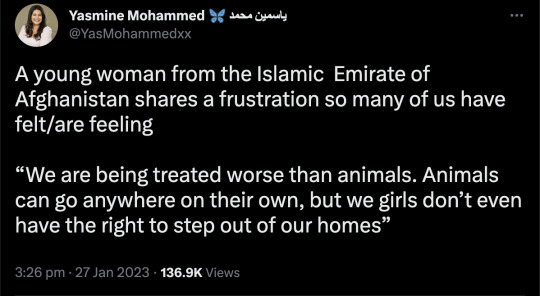

442 notes
·
View notes
Note
Colonialism is a disease
Imagine being an Arab Muslim and having the audacity to call someone else a colonizer. The illustration below is a snapshot of Islamic colonialism and occupation of other people's lands, from the 7th-9th centuries. Islam went on to attack, destroy, occupy and colonize vast swaths of Europe and southeast Asia, as well as what is now called Turkey.
The world has witnessed many colonial empires since the beginning of time. Most notably, the Mongols, Persians, Greeks, Romans, Babylonians, Egyptians, Islam/Ottomans, Portuguese, Dutch, French, Spanish, British, and American. The only empire that didn't take land, even after winning world wars, were the Americans. They actually gave back the Philippines. But I digress.
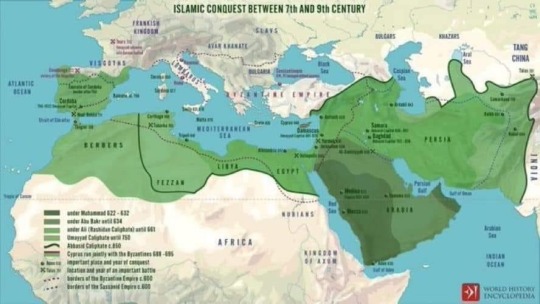
All of these empires were in large part, created by bloody conquest, and built on the backs of the newly subjugated. The Hebrews were, famously, slaves in Egypt.
No one seems to teach this in the west, focusing more on the Romans, but of all the colonialists, one of the most deadly brutal and expansionist empires were the Muslims aka the Islamists. The Islamic empire expanded by sheer, from Medina (where Muhammad massacred and enslaved the 50% majority Jewish population) all the way into western North Africa, much of Europe, and large populations of Southeast Asia (Indonesia, Malaysia, parts of India now called Pakistan, etc).
As it expanded using violence and fear, Islam literally took 100 million slaves out of Africa, and was responsible for one of the greatest mass murders in history: killing 10 million (or more) on the forced march from their homelands to the Middle East.
Some examples of Islamic slavery include the Al-Andalus slave trade, the Trans-Saharan slave trade, the Indian Ocean slave trade, the Comoros slave trade, the Zanzibar slave trade, the Red Sea slave trade, the Barbary slave trade, the Ottoman slave trade, the Black Sea slave trade, the Bukhara (Uzbekistan) slave trade, and the Khivan slave trade from which Islam took millions of slaves out of Persia to the Islamic khanates. There are Arab/Islamic societies today (Libya, a well-known example) that still trade slaves.
Compare this to Israel. Israel/Judea was never colonial nor expansionist. The Hebrews (aka Jews) were often properties of and were subjugated by, colonial empires, including the Islamic colonial empire.
They Hebrews themselves, as noted above, were most famously slaves of the the colonial Egyptian empire, some 4,000 years ago, before being murdered and subjugated by Islam starting in the 7th century. Somehow able to escape Egyptian tyranny through their own efforts (some say, by the grace of Hashem), the Hebrews settled in their current indigenous homeland 3.600 years ago - a small area by global standards, smaller than Belize, Albania, or Montenegro. They were happy there, and even at their peak, did not attempt to force convert others or expand much beyond their lands.
As historian Barbara Tuchman wrote, Israel is “the only nation in the world that is governing itself in the same territory, under the same name, and with the same religion and same language as it did 3,000 years ago.” Despite all the occupations and forced exiles, the Jews/Hebrews/Israelites have maintained a continuous presence in Judea/Israel/Samaria for some 3,600+ years. And even though Israel was granted modern statehood in 1948, it is one of the oldest continuously maintained countries in the world.
The 'modern' state of Israel came to fruition post WWII, in 1948; the redefinition of borders and modern statehood after the fall of the big colonials was in no way unusual to Israel. Many country's modern borders came to be defined in the post colonial period (post WWI & WWII). While Israel and Lebanon and Iraq and Iran and Syria and Egypt were all ancient civilizations, dating back thousands of years, modern statehood came in the 20th century: For example, statehood was granted to Egypt in 1922; Saudi Arabia and Iraq in 1932; Lebanon in 1943; Indonesia, South Korea & Vietnam in 1945; Syria & Jordan in 1946; India & Pakistan in 1947; Israel, & Myanmar in 1948; Laos, Libya & Bhutan in 1951; Cambodia in 1953; Morocco, Sudan & Tunisia in 1956; Ghana & Malaysia in 1957; and so on.
The problem is, the tribalism and supremacy of Islam, can't stand that it's once-conquered land is now in the hands of the original owners. Islam believes that once it puts a flag in the sand somewhere, it's theirs.
Oh, and by the way, Andalusia (Spain) is next in Islam's sights.
#islam#colonialism#colonialist#colonizers#israel#secular-jew#jewish#judaism#israeli#jerusalem#diaspora#secular jew#secularjew#Islamic jihad#jihad#Hamas#taliban#Isis#Iran#gaza#Samaria#judea#samaria#judea and samaria#jihadis#hamas#hamas war#iran war#islamists
73 notes
·
View notes
